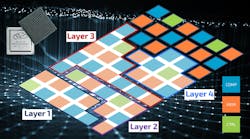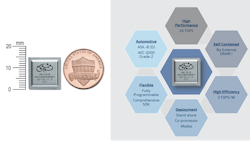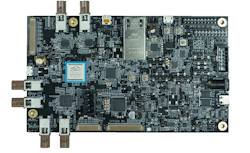It’s possible to incorporate machine-learning (ML) and artificial-intelligence (AI) methodologies at the edge, where many compact, embedded IoT devices live using standard processors and SoCs. However, this limits the functionality that can be provided due to computational limitations. Utilizing specialized AI accelerators is a requirement when tackling problems such as image recognition with streaming video
Hailo Technologies, based in Tel Aviv, has created the Hailo-8 (Fig. 1), a compact chip designed for rugged environments including automotive applications. It offers significantly higher performance while using less power than many GPGPU-based solutions. Consuming less than 1.7 W, it can deliver a 682-frame/s processing speed for the ResNet-50 benchmark with 224- by 224-pixel resolution, 8-bit precision, and a batch size of 1. Small batch sizes are important on the edge.
1. Hailo Technologies’ Hailo-8 is a compact chip designed for rugged environments, including automotive applications.
The Hailo-8 distributes multiple layers of an ML model across its collection of compute, memory, and control blocks (Fig. 2). An interconnect provides FPGA-like configurability, allowing the Hailo-8 to process one or more models at the same time.
2. The Hailo-8 can distribute multiple layers of an ML model across its collection of compute (COMP), memory (MEM), and control (CTRL) blocks.
In addition, Hailo crafted the Hailo-8 development board (Fig. 3), a Developer Suite, and software development kit (SDK). The SDK supports ONNX and TensorFlow. It handles automatic numerical conversion and emulation with profiling support.
3. The Hailo-8 development board, Developer Suite, and SDK are available to select customers.
The Hailo-8 can act as a host driven by sensors with a MIPI or parallel interface. The system is able to use SDIO or Ethernet to communication with other systems. Furthermore, an application processor can take advantage of the Hailo-8 with these interfaces as well as a PCI Express (PCIe) interface.
Sample chips are available now with production in 2020. The chip will be ASIL-B certifiable.




